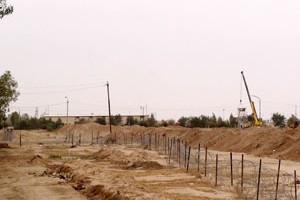 Sharam Taromsary
Sharam Taromsary
Following the meeting of Foreign Ministers of the European Union in Brussels, 23 May, speaking at a press briefing, Baroness Ashton, Vice-President of the European Commission told reporters that along with Syria and Libya, Camp Ashraf was one of the subjects of discussion. She had pledged earlier at a plenary session of European Parliament to bring up Camp Ashraf, at the meeting. The European Parliament Delegation to Iraq has proposed a plan to resolve the situation by removing the residents from the camp and relocating them in other countries in Europe and North America.
Any long-term solution however, first requires immediate and effective protection of Ashraf’s residents in place to prevent more killing. Europe needs to take the initiative to involve the United Nations and the United States in offering real safety to these unarmed people. If that is not possible, then Europe should take the lead and consider providing its own forces to prevent another massacre. The international mandate exists: parliaments in 35 countries, as well as all human rights authorities, have asserted the rights of Ashraf residents to be protected.
But an Iraqi government announcement to relocate the residents of Ashraf to another place in Iraq represents no more than an attempt to annihilate the Iranian resistance completely. At present, the limited visibility at Ashraf at least allows its residents to alert the world to the atrocities they must endure.
Also, the ultimatum given to the residents to leave by the end of 2011 by Iraq, if not supported by conditions guaranteed by the EU, the US and the UN, could not only destroy the possibility of a permanent, peaceful solution for the crisis, but could also set the stage for a new massacre.
The 3,500 unarmed Iranians, members of its main opposition movement, live In Ashraf and have done so for nearly three decades, obedient to Iraqi law and respectful of both local residents and national government. The Iraqi government has laid siege to these people for more than two years now, largely at the behest of the Iranian regime. On Friday, 8 April 2011, thirty-four women and men lost their lives when the Iraqi army attacked their camp, Ashraf. If the world is to prevent another massacre, decisive action is required now.
The European Union must support the European Parliament’s plan. It represents a long-term solution and one that will save the West from further shame in its inaction thus far to prevent the death of unarmed opponents of the Iranian vicious regime.
The European Parliament’s Delegation to Iraq has further argued for the following pre-conditions to a resolution of the Ashraf situation: the removal of Iraqi forces from the perimeter of Ashraf; an end to the siege (including lifting the ban on access to journalists, parliamentary groups, lawyers and family members of the residents); immediate access to medical services; an independent inquiry into the massacre of April 8, 2011; and the return of belongings confiscated on April 8.
Let us dispel the Iraqi government’s defence of its genocidal policy. First, it claims that there is a land issue at stake and second that there is an issue of Iraqi sovereignty. On the first point, the assertion of the rights of local farmers (if such an issue really exists) does not entail the use of well-armed troops in mechanized units. As to the issue of sovereignty, the residents of Ashraf have repeatedly declared that they respect Iraq’s sovereignty. Using the concept of ‘Iraqi sovereignty’ as an excuse for suppressing the residents of Ashraf only serves to conceal the hijacking of that very sovereignty by the Iranian regime.
Make no mistake that the Iraqi government is acting at the behest of the Iranian regime. The Iraqi Prime Minister, al-Maliki, needs all the help he can get from the mullahs because of the unstable nature of his rule. This is especially the case this spring with increasing and persistent popular protests in Iraq.
In February this year, when popular protest erupted again in Iran, the Iranian parliament, the Majlis, reported that the PMOI had played a significant role in the demonstrations. As such, the destruction of unarmed opponents of the PMOI at Ashraf is central to the Iranian regime’s attempts to stay in power in the teeth of widespread popular disgust. It is telling that the clerical regime has played the videos of the massacre in Ashraf in political prisons in an attempt to demoralize their inmates.
Ashraf residents have experienced a string of broken promises. The United States had promised each and every one of them that they would be protected in exchange for their weaponry. Instead, the US abandoned both Ashraf and its obligations under international law to the Iraqi government. Recently, the President of the United States announced that the country’s intervention in Libya was justified because it would save the lives of civilians. This imperative is now manifested in Ashraf and yet he is silent.
This appeasement towards the regime, manifested in the silence and inaction on Ashraf, as well as the continuing inclusion of the PMOI on the State Department terrorism list, will ultimately harm Western interests. If the United States will not act, let leadership come from Europe – both for its interests and for its conscience.







